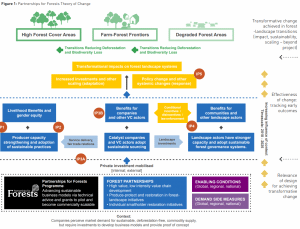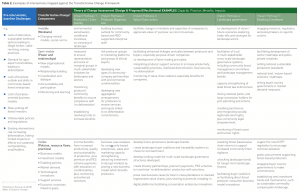Discourse on transformative change and how to achieve it is rapidly increasing in international development and environment circles – because of the realisation that previous approaches have not been sufficient and finding effective solutions to social and ecological challenges is ever more urgent. There is an increasing call and ambition for transformative change, but it is often hard to know exactly what is meant by that and even more how it can be realised. Different actors will have differing definitions of transformative change. We suggest that transformative change involves tangible aspects such as access to finance and sustainable technologies, but also more intangible ones, such as mindsets and visions changes, and shifts in social norms, values, and power relationships. Thus, the assessment of evaluation of transformative change is a complex task, which requires an in-depth approach to understand the underlying root causes and dynamics, and ideally independent and participatory stakeholder monitoring and learning.
As evaluators, in 2018, we were tasked by UK Aid to evaluate their flagship ‘Partnerships for Forests (P4F) Programme’ to inform the programme management and their own future policies and programming. The programme, which catalyses finance for sustainable forestry and land use, has ‘transformative change ambitions’ and reports on ‘transformative change’ as part of the UK Governments’ International Climate Finance (ICF) commitment. Hence, transformative change is part of our evaluation terms of reference, alongside other OECD DAC Criteria (relevance, effectiveness, sustainability etc). This led us, as the evaluation-for-learning team, to question: ‘What does transformative change look like in this programme and how can we evaluate whether there is any progress?’ To answer this question, we developed a systematic methodology and have applied it to a set of P4F programmes in evaluation studies, which principally aimed to inform the programme’s adaptive management.
The methodology draws upon complexity thinking, which is helpful to distinguish between changes that are more incremental in nature and those that are more far-reaching and transformative in a defined system. Firstly, we developed our understanding of transformative change to guide the evaluative studies, as follows. Transformative change involves a fundamental shift in the functioning, relationships, and dynamics of a socio-ecological system. Incremental approaches focus on individual actors or single segments of a system only, with limited ambition in terms of the changes sought and addressing symptoms rather than underlying causes. Transformative change has depth, greater magnitude, and addresses all relevant system components. To achieve system transformation involves deep and synchronous or appropriately sequenced changes in invisible, as well as visible system conditions, components, and relationships. Drawing upon Kania et al (2018) ‘Water of System Change’, we included the invisible conditions (mental models, values, and social norms), semi-invisible conditions (power and relationships), and visible conditions (policies, resource flows and practices).
Secondly, we applied this understanding in practice. To do so, we used the theory of change for the P4F programme and produced a linked Transformative Change Framework (TCF). The TCF defines incremental and transformative change for the five impact pathways that make up the overall theory of change. Each of these pathways focuses on different groups of actors and scales, with anticipated changes in capacity, practices, and institutions for 13 specific transformative change components. These components include the following: changes in mental models, relationships, organisational models, coordination / dialogue, accountability, monitoring and learning, business and investment models, technologies, policies, support services and economic incentives. We used an approach of evaluative scales to support assessment of performance in a semi-quantitative way.

This approach helps us, as evaluators, to more intensively scrutinize the different initiatives funded by this global programme as to their transformative potential and to assess signs of achievement in terms of progress towards a desirable state. It is important to recognize that achieving systemic shifts often takes time and is often challenging, but early analysis and empirical data is ever more important as solutions become more urgent. We need to know how far current approaches, with their combinations of interventions, are creating the conditions for positive, systemic shifts. In tropical forestry we cannot wait another decade to find out that current initiatives are not sufficient given climate, biodiversity, human rights, and social inequality imperatives.

The findings from our evaluation-for-learning work overall, and specifically on transformative change assessment, was fed back to the P4F programme and UK Aid informing to influence their decision-making in learning cycles. Follow-on evaluations are underway in 2021 and will generate more lessons.


